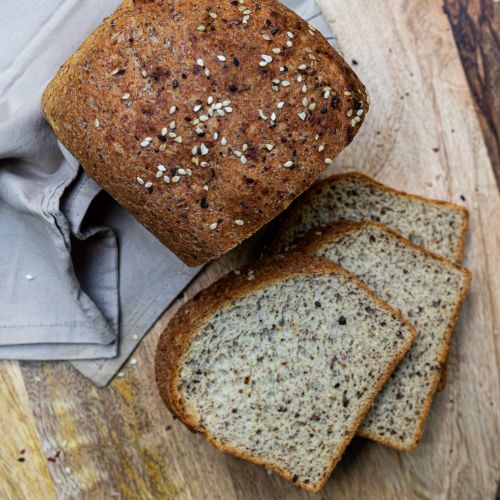
Bread is one of the most common foods around the world—served at breakfast tables, packed into lunchboxes, and enjoyed with dinners. From soft sandwich slices to rustic sourdough loaves, it’s a staple in countless diets. But when gut health comes into the picture, bread often becomes a controversial topic. Some people blame it for bloating, discomfort, or even long-term digestive issues, while others argue that certain types of bread can actually benefit gut health.

So, what’s the truth? Does bread help or harm your gut? Let’s explore the facts and uncover how your bread choices impact digestion.
Your digestive system is home to an incredible community of microorganisms known as the gut microbiome. These trillions of bacteria and microbes help with digestion, nutrient absorption, immunity, and even mental health. A balanced gut microbiome helps your body work at its best. But an imbalance can lead to bloating, fatigue, and other health concerns.
Your diet is key to keeping this balance intact. Foods that are high in fiber and prebiotics feed the beneficial bacteria in your gut, while processed, nutrient-poor foods can disrupt it. Where does bread fit in? It all comes down to the type of bread you choose.
Not all bread is created equal. Many store-bought breads are highly processed and made with refined flour, which strips away the bran and germ—the parts of the grain that provide fiber and essential nutrients. Here’s why this matters for gut health:
Consuming these breads regularly can leave you feeling bloated and unsatisfied while contributing little to digestive wellness.
The idea that bread is always bad for your gut is a myth. In fact, certain breads can provide gut-friendly benefits. Here are four types worth adding to your shopping list:
1. Whole-Grain Bread
Whole-grain bread ranks among the top choices for supporting gut health. Unlike refined bread, it keeps the entire grain intact, which means it contains fiber, vitamins, and minerals. Fiber acts as a prebiotic, feeding good bacteria in your gut and promoting healthy digestion.
2. Sourdough Bread
Sourdough is made through a natural fermentation process using wild yeast and lactic acid bacteria. This process breaks down gluten and starches, making the bread easier to digest. It also produces beneficial compounds that can help balance blood sugar and encourage a healthy gut microbiome.
Look at what experts have to say:
Video credits: Sameer Islam MD
3. Low-Carb, High-Fiber Bread
Low-carb breads often include ingredients like almond flour, flaxseed, and psyllium husk—foods naturally high in fiber and healthy fats. These breads not only reduce carbohydrate intake but also deliver prebiotic fiber, which is essential for a thriving gut.
4. Sprouted Grain Bread
Sprouted bread is made from grains that have started germinating. This process makes nutrients more bioavailable and improves digestibility. It’s also rich in antioxidants and fiber, which support a healthy gut environment.
Is Gluten the Real Villain?
Gluten often gets blamed for gut problems, but the truth is more nuanced. If you have celiac disease or gluten sensitivity, gluten can cause serious health issues. However, for most people, gluten isn’t the main problem—ultra-processed bread is. By choosing breads made with clean, whole ingredients and natural fermentation, you can enjoy bread without upsetting your digestive system.
If bread seems to bother your digestion, watch for these symptoms:
These signs don’t mean you have to eliminate bread entirely. Instead, they may indicate that you need to switch to higher-quality, gut-friendly options.
When shopping for bread, keep these tips in mind:

It all depends on what you choose. Highly processed, low-fiber breads can upset digestion and do little for your microbiome. But breads that are rich in fiber, naturally fermented, or made from wholesome ingredients can support gut health and keep your digestive system happy.
In short: bread isn’t the problem—poor bread choices are.
Bread doesn’t have to be off your menu. By choosing nutrient-dense, high-fiber, and low-carb options, you can enjoy this staple without compromising your gut health.
If you’re ready to make the switch, check out Low Carb Avenue. Their breads are made with premium ingredients like almond flour, flaxseed, and psyllium husk, designed to support digestion while delivering great taste.



Don’t want to buy online? You can buy our low carb bread at any of these local retail locations
Alabama
Arkansas
Connecticut
Delaware
District of Columbia
Florida
Georgia
Illinois
Indiana
Iowa
Kansas
Kentucky
Louisiana
Maine
Maryland
Massachusetts
Michigan
Minnesota
Mississippi
Missouri
Nebraska
New Hampshire
New Jersey
New York
North Carolina
Ohio
Oklahoma
Pennsylvania
Rhode Island
South Carolina
Tennessee
Vermont
Virginia
West Virginia
Wisconsin
Armed Forces (AA)
Armed Forces (AE)
Armed Forces (AP)